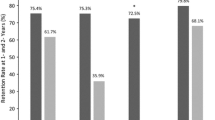Abstract
Although new antiepileptic drugs are assessed initially by adding them to pre-existing treatment, it is only through monotherapy studies that their therapeutic potential can be characterized in full. Since long-term treatment with a placebo alone is ethically unacceptable in epilepsy, the classical monotherapy assessment of antiepileptic drugs involves randomization of newly diagnosed patients to treatment with the investigational drug or an established active control, followed by long-term monitoring to determine seizure remission rates and potential adverse effects. These protocols, however, are time-consuming and they are unlikely to demonstrate a superior efficacy of the new agent over a comparator. In turn, a “no-difference” outcome in terms of seizure control does not allow one to exclude the possibility that all the treatments were equally ineffective, and may therefore not be regarded as proof of efficacy by regulatory authorities. To circumvent these problems, innovative designs for the early monotherapy evaluation of new antiepileptic drugs have been developed in recent years. These protocols, often referred to as “regulatory trials”, involve short-term studies in which a full dosage of the investigational agent is compared with a placebo or with a suboptimal dosage of an active control (possibly the investigational agent itself). To minimize the risks associated with an ineffective treatment, provisions are made that require exit from the trial if seizures are inadequately controlled. Efficacy end-points are time to the nth seizure and patients' retention on the allocated treatment. These studies have been conducted in patients undergoing discontinuation of treatment for presurgical assessment, in newly diagnosed patients, and in patients whose concomitant anticonvulsants were withdrawn for trial purposes. While these trials allow statistical demonstration of superior efficacy over a comparator, allocation of patients to ineffective or suboptimal treatments raises serious ethical concerns. The scientific value of these studies is also doubtful, because dosing schedules and duration of treatment are hardly relevant to routine clinical practice. Clinicians do not need to know whether a new drug given for a few days is better than nothing, but how that drug compares with established agents given in optimized dosages for long periods of time. The ethical and scientific justification for regulatory trials should be reassessed, and steps are urgently needed to stimulate implementation of long-term randomized comparative trials under conditions that are more relevant to clinical needs.
Similar content being viewed by others
Author information
Authors and Affiliations
Additional information
Received: 29 October 1997 / Accepted: 4 November 1997
Rights and permissions
About this article
Cite this article
Perucca, E. Innovative monotherapy trial designs for the assessment of antiepileptic drugs: a critical appraisal. E J Clin Pharmacol 54, 1–5 (1998). https://doi.org/10.1007/s002280050411
Issue Date:
DOI: https://doi.org/10.1007/s002280050411




